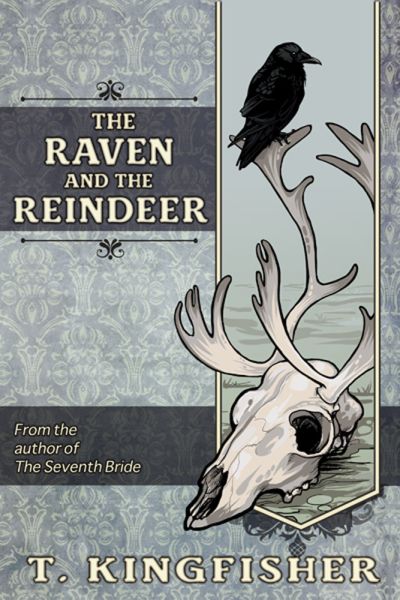“In all the old stories, the only thing that ever won was love. And occasionally a good sharp knife.”
The Raven and the Reindeer
By T. Kingfisher

24 Feb, 2016
0 comments
T. Kingfisher’s 2016 novel The Raven and the Reindeer begins like this:
Once upon a time, there was a boy born with frost in his eyes and frost in his heart.
Kay is prime Snow Queen bait: beautiful, obsessive, and coldly proud. It was perhaps inevitable that Kay would fall for the Snow Queen’s enticements, abandoning home, family, and friends for ultimately fatal delights. Kay’s doom seems assured.
But this isn’t frost-eyed Kay’s story. It’s Gerta’s.
Kay’s friend Gerta is the sole witness to Kay’s kidnapping. Determined to rescue Kay in the name of True! Love! Gerta sets out alone, on a journey to the Snow Queen’s castle north of north itself. She plans to challenge a force of nature whose very gaze can freeze mortals in their tracks.
Gerta must traverse a dangerous magical world filled with witches, talking birds, and bandits, a world that offers our naive heroine both allies and enemies. Gerta has a talent for appealing to the best in people; she is also blind to the worst. The first trait wins her allies and lovers; the second could get her bewitched, captured, or killed.
And if she manages to survive the journey north of north, the severest challenge of all is waiting for her.…
~oOo~
Gerta thinks she understands her relationship with Kay:
[Kay] did not know that Gerta treasured these statements, saving them up and repeating them to herself at night. They were her great comfort. In summer, when he went around with the other boys and pretended to ignore her, she remembered his words.
She thought, I bet he doesn’t say things like that to the other boys. That’s the part of himself he only shows to me. That’s the important bit.
Which only goes to show that you can be both right and completely wrong, all at the same time.
This did not seem like a fairy tale that would end happily. Sometimes I would have appreciated a friendly reassurance from the author, telling me that this story wasn’t going to end with Mousebones the Raven eating Gerta’s eyes. Because while it is true, as the friendly raven points out, that if someone is going to eat your eyes after you’ve died, it is better that that person be a friend1, it is even better if you don’t die in the first place.
This is not to say that I wanted the author to assure me that Gerta and I would get the happy ending we hoped for. It was clear from the start that Gerta did not understand Kay at all; “they lived happily ever after” would be impossible (at least the conventional version). But even something like this would have been helpful.
This is not one of those tedious grimdark novels where everyone is awful at heart and all decisions lead to dooooooooom, but it does take place in a notably un-gemütlichkeit world. Not only is the Snow Queen a figure of vast inhuman malice, the bandits are quite comfortable with killing people; there are cannibals as well. Gerta needs more than good intentions to survive.
None of this would matter if Gerta were, like Kay, the sort of person to whose fate the reader would be largely indifferent2. But Gerta is an appealing character, whose innocence is matched with an ability to learn from experience.
I do have to warn the more timid readers who may be wondering
that yes, yes it is3 [3]. But not necessarily the one Gerta hoped to figure in.
The Raven and the Reindeer can be purchased here.
1: Don’t poll random people in the bus about whether or not they think this statement is true. Their input is not going to be helpful.
2: While Kay isn’t intentionally malicious, he isn’t nice to Gerta. I was hoping, not that he would not survive, but that he would get an instructive comeuppance.
3: That’s two Princess Bride references in one review! Relax; this book is more like the genial movie than the rather bleak book on which the movie was based.
